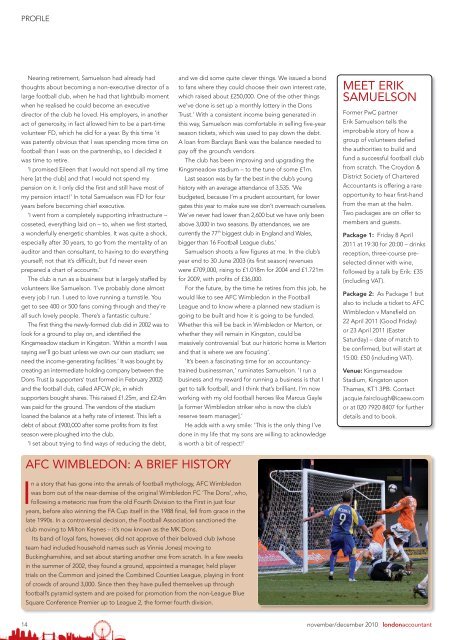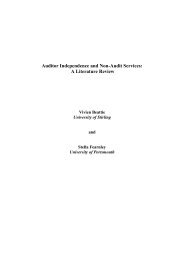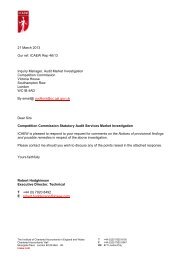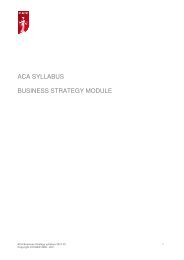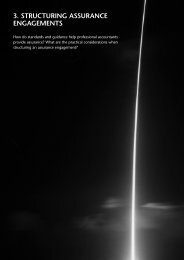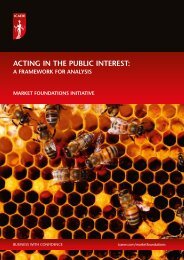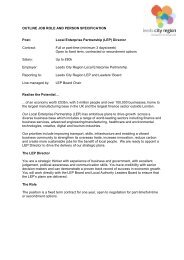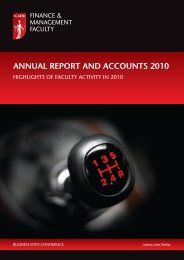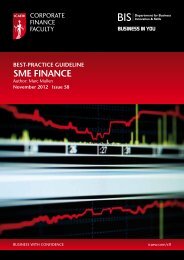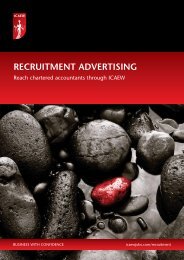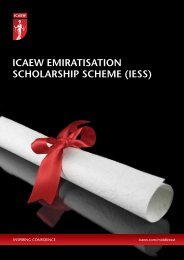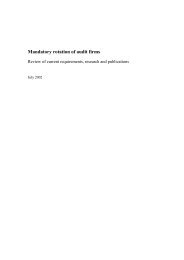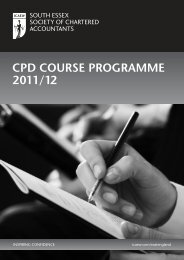londonaccountant - ICAEW
londonaccountant - ICAEW
londonaccountant - ICAEW
- No tags were found...
Create successful ePaper yourself
Turn your PDF publications into a flip-book with our unique Google optimized e-Paper software.
PROFILENearing retirement, Samuelson had already hadthoughts about becoming a non-executive director of alarge football club, when he had that lightbulb momentwhen he realised he could become an executivedirector of the club he loved. His employers, in anotheract of generosity, in fact allowed him to be a part-timevolunteer FD, which he did for a year. By this time ‘itwas patently obvious that I was spending more time onfootball than I was on the partnership, so I decided itwas time to retire.‘I promised Eileen that I would not spend all my timehere [at the club] and that I would not spend mypension on it. I only did the first and still have most ofmy pension intact!’ In total Samuelson was FD for fouryears before becoming chief executive.‘I went from a completely supporting infrastructure –cosseted, everything laid on – to, when we first started,a wonderfully energetic shambles. It was quite a shock,especially after 30 years, to go from the mentality of anauditor and then consultant, to having to do everythingyourself; not that it’s difficult, but I’d never evenprepared a chart of accounts.’The club is run as a business but is largely staffed byvolunteers like Samuelson. ‘I’ve probably done almostevery job I run. I used to love running a turnstile. Youget to see 400 or 500 fans coming through and they’reall such lovely people. There’s a fantastic culture.’The first thing the newly-formed club did in 2002 was tolook for a ground to play on, and identified theKingsmeadow stadium in Kingston. ‘Within a month I wassaying we’ll go bust unless we own our own stadium; weneed the income-generating facilities.’ It was bought bycreating an intermediate holding company between theDons Trust (a supporters’ trust formed in February 2002)and the football club, called AFCW plc, in whichsupporters bought shares. This raised £1.25m, and £2.4mwas paid for the ground. The vendors of the stadiumloaned the balance at a hefty rate of interest. This left adebt of about £900,000 after some profits from its firstseason were ploughed into the club.‘I set about trying to find ways of reducing the debt,and we did some quite clever things. We issued a bondto fans where they could choose their own interest rate,which raised about £250,000. One of the other thingswe’ve done is set up a monthly lottery in the DonsTrust.’ With a consistent income being generated inthis way, Samuelson was comfortable in selling five-yearseason tickets, which was used to pay down the debt.A loan from Barclays Bank was the balance needed topay off the ground’s vendors.The club has been improving and upgrading theKingsmeadow stadium – to the tune of some £1m.Last season was by far the best in the club’s younghistory with an average attendance of 3,535. ‘Webudgeted, because I’m a prudent accountant, for lowergates this year to make sure we don’t overreach ourselves.We’ve never had lower than 2,600 but we have only beenabove 3,000 in two seasons. By attendances, we arecurrently the 77 th biggest club in England and Wales,bigger than 16 Football League clubs.’Samuelson shoots a few figures at me. In the club’syear end to 30 June 2003 (its first season) revenueswere £709,000, rising to £1.018m for 2004 and £1.721mfor 2009, with profits of £36,000.For the future, by the time he retires from this job, hewould like to see AFC Wimbledon in the FootballLeague and to know where a planned new stadium isgoing to be built and how it is going to be funded.Whether this will be back in Wimbledon or Merton, orwhether they will remain in Kingston, could bemassively controversial ‘but our historic home is Mertonand that is where we are focusing’.‘It’s been a fascinating time for an accountancytrainedbusinessman,’ ruminates Samuelson. ‘I run abusiness and my reward for running a business is that Iget to talk football, and I think that’s brilliant. I’m nowworking with my old football heroes like Marcus Gayle[a former Wimbledon striker who is now the club’sreserve team manager].’He adds with a wry smile: ‘This is the only thing I’vedone in my life that my sons are willing to acknowledgeis worth a bit of respect!’MEET ERIKSAMUELSONFormer PwC partnerErik Samuelson tells theimprobable story of how agroup of volunteers defiedthe authorities to build andfund a successful football clubfrom scratch. The Croydon &District Society of CharteredAccountants is offering a rareopportunity to hear first-handfrom the man at the helm.Two packages are on offer tomembers and guests.Package 1: Friday 8 April2011 at 19:30 for 20:00 – drinksreception, three-course preselecteddinner with wine,followed by a talk by Erik: £35(including VAT).Package 2: As Package 1 butalso to include a ticket to AFCWimbledon v Mansfield on22 April 2011 (Good Friday)or 23 April 2011 (EasterSaturday) – date of match tobe confirmed, but will start at15:00: £50 (including VAT).Venue: KingsmeadowStadium, Kingston uponThames, KT1 3PB. Contactjacquie.fairclough@icaew.comor at 020 7920 8407 for furtherdetails and to book.AFC WIMBLEDON: A BRIEF HISTORYIn a story that has gone into the annals of football mythology, AFC Wimbledonwas born out of the near-demise of the original Wimbledon FC ‘The Dons’, who,following a meteoric rise from the old Fourth Division to the First in just fouryears, before also winning the FA Cup itself in the 1988 final, fell from grace in thelate 1990s. In a controversial decision, the Football Association sanctioned theclub moving to Milton Keynes – it’s now known as the MK Dons.Its band of loyal fans, however, did not approve of their beloved club (whoseteam had included household names such as Vinnie Jones) moving toBuckinghamshire, and set about starting another one from scratch. In a few weeksin the summer of 2002, they found a ground, appointed a manager, held playertrials on the Common and joined the Combined Counties League, playing in frontof crowds of around 3,000. Since then they have pulled themselves up throughfootball’s pyramid system and are poised for promotion from the non-League BlueSquare Conference Premier up to League 2, the former fourth division.14november/december 2010 <strong>londonaccountant</strong>


